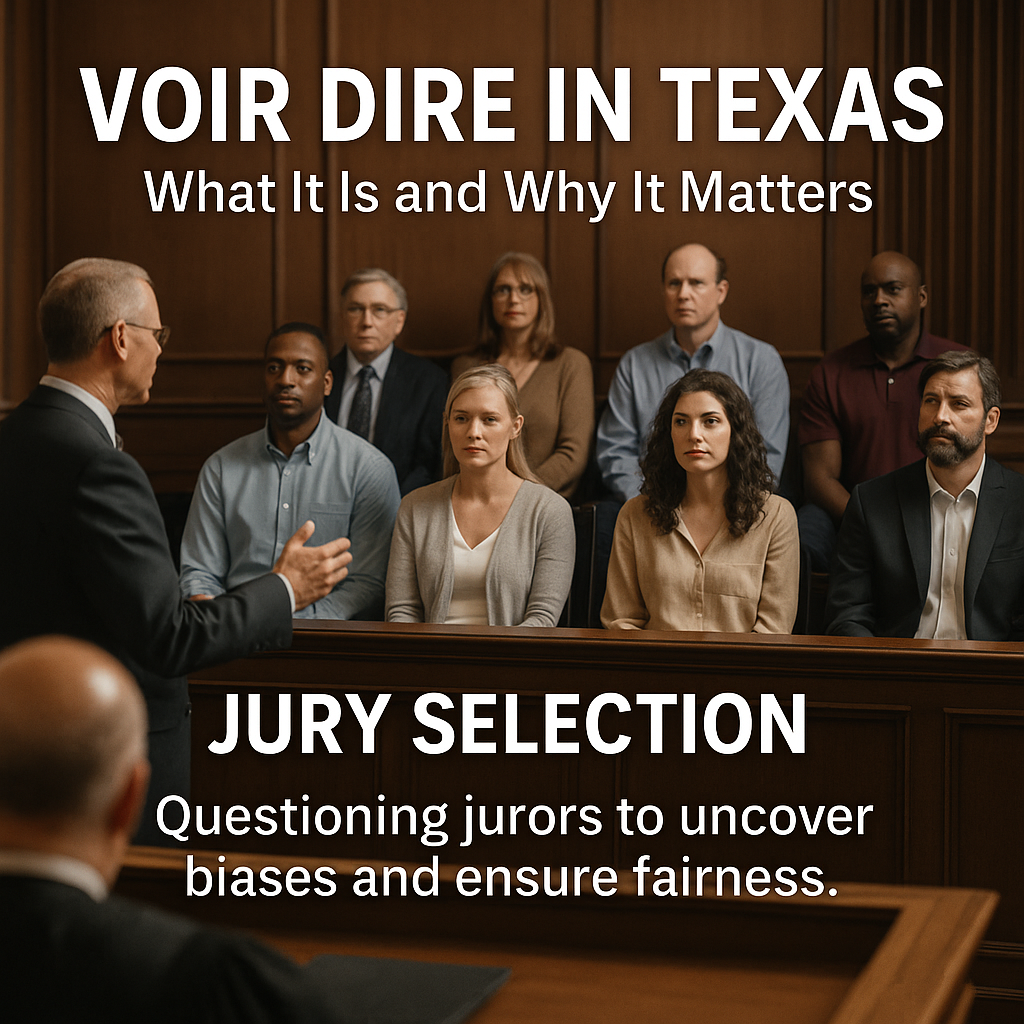
In Texas trials, voir dire (pronounced vwahr-deer) is the process by which attorneys and the court question prospective jurors to determine whether they can serve fairly and impartially. It is often the very first phase of a jury trial, and it sets the tone for the case.
The Purpose of Voir Dire
The aim of voir dire is twofold:
- Identify Biases – Both sides want to ensure that jurors who hold biases—whether obvious or subtle—are either excused for cause or flagged as unfavorable.
- Educate and Connect – Attorneys also use voir dire to introduce key themes of their case, begin to build rapport with jurors, and gauge reactions to sensitive issues.
Ultimately, voir dire helps create a fair and impartial jury panel, which is the bedrock of the trial system.
What Attorneys Can and Cannot Do in Voir Dire
Texas law and court rules give attorneys wide latitude in questioning jurors, but there are limits.
Allowed:
- Asking questions to uncover bias or prejudice (e.g., views on damages, law enforcement, or business disputes).
- Exploring attitudes about key issues in the case (such as personal injury, divorce, or contract disputes).
- Requesting that a juror be excused for cause if they demonstrate clear inability to follow the law.
- Exercising peremptory challenges to remove jurors without giving a reason (subject to constitutional limits).
Not Allowed:
- Arguing the case or presenting evidence during voir dire.
- Committing a juror to a specific verdict outcome (“If I prove X, will you rule for me?”).
- Asking questions that are too broad, irrelevant, or designed to embarrass the juror.
- Using peremptory strikes in a discriminatory way (such as excluding jurors solely because of race, ethnicity, or gender, which is barred under the U.S. Supreme Court’s Batson ruling).
Strategy Behind Voir Dire
Good attorneys use voir dire strategically. They look for jurors whose life experiences, values, or attitudes align with their client’s case. For example:
- In a personal injury case, a plaintiff’s attorney may want to know if jurors believe damages in lawsuits are generally “out of control.”
- In a divorce case, a lawyer might probe views on parenting roles, finances, or marital fault.
- In a contract case, counsel may focus on jurors’ views about personal responsibility and business dealings.
The goal is not to find the “perfect” juror, but to exclude those who might be unfairly predisposed against one’s client.
Voir Dire in Practice in Texas
Texas is somewhat unique in giving attorneys more freedom in voir dire than many other states. For example, Texas courts generally allow open-ended questions, and attorneys may directly interact with jurors instead of having the judge do all the questioning.
However, judges have discretion to limit the scope if questioning becomes repetitive, irrelevant, or veers into argument. Knowing where that line is—and staying on the right side of it—can be critical.
Conclusion
Voir dire is one of the most important stages of a trial in Texas. It gives litigants a chance to protect their right to an impartial jury while also introducing jurors to the themes of their case. Done well, voir dire can lay the groundwork for a favorable outcome. Done poorly, it can leave a party stuck with a jury that may not be open to their side.
At David C. Barsalou, Attorney at Law, PLLC, we help clients navigate business, family, tax, estate planning, and real estate matters ranging from document drafting to litigation with clarity and confidence. If you’d like guidance on your situation, schedule a consultation today. Call us at (713) 397-4678, email barsalou.law@gmail.com, or reach us through our Contact Page. We’re here to help you take the next step.